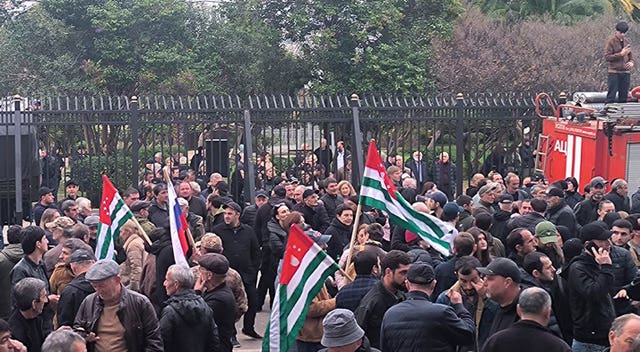
Opposition protesters in Georgia’s breakaway province of Abkhazia and its separatist government appeared to have reached an agreement to end days of unrest in which key government buildings were seized by demonstrators and at least 14 people were injured in clashes with police.
Demonstrators stormed the buildings on Friday to protest against new measures allowing Russians to buy property in the seaside region, and demanded the removal of self-styled Abkhazian president Aslan Bzhania.
Mr Bzhania said he was prepared to resign if the protesters ceded control of the buildings, but the opposition refused to do so until he stepped down.
Russian state news outlet Sputnik reported early on Tuesday that Mr Bzhania, who is backed by Russia, submitted his resignation and the opposition agreed to leave the occupied buildings.

Sputnik quoted Abkhazian vice president Badra Gunba as saying that the agreement was reached after more than nine hours of negotiations.
Mr Bzhania’s resignation — which he promised to walk back if the protesters did not cede control of government buildings — had to be approved by Abkhazia’s parliament, and Mr Gunba would become acting president, Spuntik reported.
Most of Abkhazia broke away from Georgia in fighting that ended in 1993, and Georgia lost control of the rest of the territory in a short war with Russia in 2008.
Russia recognises Abkhazia as an independent country, but many Abkhazians are concerned that the region of about 245,000 people is a client state of Moscow.
Abkhazia’s mountains and Black Sea beaches make it a popular destination for Russian tourists and the demand for holiday homes could be strong.

At least 14 people were injured on Friday when opposition protesters clashed with police, Russian state agencies reported.
Politicians had gathered at the region’s parliament building to discuss ratifying measures allowing Russian citizens to buy property in the breakaway state.
But the session was postponed as demonstrators broke down the gate to the building’s grounds with a truck and streamed inside. Some threw rocks at police, who responded with tear gas.
The arrest of five opposition figures at a similar demonstration last week set off widespread protests the next day in which bridges leading to Sukhumi were blocked.


Why are you making commenting on The National only available to subscribers?
We know there are thousands of National readers who want to debate, argue and go back and forth in the comments section of our stories. We’ve got the most informed readers in Scotland, asking each other the big questions about the future of our country.
Unfortunately, though, these important debates are being spoiled by a vocal minority of trolls who aren’t really interested in the issues, try to derail the conversations, register under fake names, and post vile abuse.
So that’s why we’ve decided to make the ability to comment only available to our paying subscribers. That way, all the trolls who post abuse on our website will have to pay if they want to join the debate – and risk a permanent ban from the account that they subscribe with.
The conversation will go back to what it should be about – people who care passionately about the issues, but disagree constructively on what we should do about them. Let’s get that debate started!
Callum Baird, Editor of The National
Comments: Our rules
We want our comments to be a lively and valuable part of our community - a place where readers can debate and engage with the most important local issues. The ability to comment on our stories is a privilege, not a right, however, and that privilege may be withdrawn if it is abused or misused.
Please report any comments that break our rules.
Read the rules here